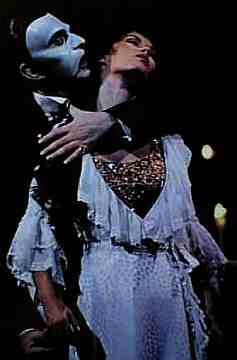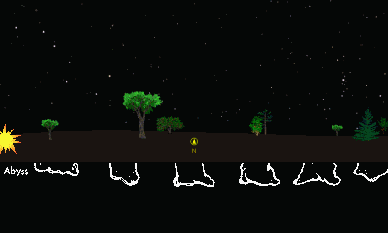Lesson 2 - Night
At night the Sun travels under the world back to the East so it can rise again. It travels
through the underworld, i.e. under-world, - under the world.
During the day the Sun gives us light and warmth. That's good.
At night the Sun no longer gives us that light and warmth. That's bad.
Darkness has always been the natural enemy of man.
Evil is dark. For example, we talk about a person's "dark side" when referring to his or
her evil tendencies. Evil is black, the color of darkness. The stereotypical villain
wears black, whereas the stereotypical good person wears white, a bright color
reminiscent of light. Nighttime is an evil time when our world is dark and black. The
Devil is the "Prince of Darkness," literally.
Gerald Massey (1828-1907), who spent his life studying comparative religion,
describes further:
"The Hebrew devil, or Satan, means the opponent or adversary, and
the first great natural adversary recognized by primitive man
was Darkness--simply darkness, the constant and eternal enemy
of the light--that is, the power of darkness was literal before
it became metaphorical, moral, or spiritual.
"Hence darkness itself was the earliest devil or adversary, the
obstructor and deluder of man, the eternal enemy of the sun. We
speak of the "jaws of darkness;" and darkness was the
vast, huge, swallower of the light, night after night. We know
this was identified as the primary power, because the primitive
or early man reckoned time by nights, and the years by Eclipses.
This mode of reckoning was first and universal. So many darks
preceded so many days. The dark power is primarily in all the
oldest traditions and cults of the human race. Hence sacrifice
was first offered to the powers of darkness. The fore-words of
universal mythology are "there was darkness."1
All was dark at first within the mind; and the all was the darkness
that created dread without. The influence of night, the eclipse,
and the black thunder-cloud being first felt, the primitive man
visibly emerges from the shadow of darkness as deeply impressed
and indelibly dyed in mind as was his body with its natural blackness.
The black man without was negroid within, as his reflection remains
in the mirror of mythology. The darkness then, in natural phenomena,
was the original devil that put out the light by swallowing it
incessantly, as the subtle enemy, the obstructor, deluder, and
general adversary of man. The first form of the Devil was female,
called the Dragon of Darkness, who was Tiamat in Akkad, and Typhon
in Egypt. Typhon gave birth to Sut, who became the Egyptian devil—our
Satan—and who was represented by the Black jackal, the voice
of Darkness; and Sut, the black one, gives us the name of Soot,
the black thing. Angro-Mainyus, the Persian devil, was the black
one of the two powers of Light and Darkness.
"Primitive man, however, did not imagine or personify a devil behind
visible phenomena, that caused the darkness. Darkness itself was
the devil, and even as late as the Parsee Bundahish (which means
the aboriginal creation) external darkness is the devil."2
The following sublime description of Night is an extract from
the Vedas, made by Sir William Jones:
"Night approaches, illumined with stars and planets, and, looking on all sides
with numberless eyes, overpowers all meaner lights. The Immortal goddess
pervades the armament, covering the low valleys and shrubs, the lofty mountains
and trees, but soon she disturbs the gloom with celestial effulgence. Advancing
with brightness, at length she recalls her sister
Morning; and the
nightly shade gradually welts away. May she at this time be propitious! She,
in whose early watch we may calmly recline in our mansions, as birds repose
upon the trees. Mankind now sleep in their towns; now herds and flocks peacefully
slumber, and the winged creatures, swift falcons, and vultures. O Night!
avert from us the she-wolf and the wolf; and, oh! suffer us to pass thee in
soothing rest! Oh, morn! remove In due time this black, yet visible overwhelming
darkness, which at present enfolds me, as thou enablest me to remove
the cloud of their dells.
Daughter of Heaven, I approach thee with praise, as
the cow approaches her milker; accept, O Night ! not the hymn only, but the
oblation of thy suppliant, who prays that his foes may be subdued."
3
Note how the following two descriptions of night affecting the senses are similar even
though they were written 400 years apart:
 Shakespeare - A Midsummer's Night's Dream (1594)
Shakespeare - A Midsummer's Night's Dream (1594)
Act 5, Scene 1, lines 1971-1973
♫Listen Here♫
O grim lookt night, o night, with hue so blacke,
O night, which euer art, when day is not:
O night, O night, alacke, alacke, alacke,
Act 3, Scene 2, lines 177-180
Dark night, that from the eye his function takes,
The ear more quick of apprehension makes;
Wherein it doth impair the seeing sense,
It pays the hearing double recompense.
From Andrew Lloyd Webber's play The Phantom of the Opera
lyrics by Gary Hart (1986)
Song: THE MUSIC OF THE NIGHT
♫Listen Here♫

Nighttime... sharpens... heightens... each sensation
Darkness... stirs... and wakes imagination
Silently the senses... abandon their defenses...
Slowly... gently... night unfurls its splendour
Grasp it... sense it... tremulous and tender
Turn your face away from the garish light of day
Turn your face away from cold, unfeeling light
And listen to the music of the night
Close your eyes and surrender to your darkest dreams
Leave all thoughts of the world you knew before
Close your eyes, let your spirit start to soar
And you'll live as you've never lived before
Softly, deftly, music shall caress you
Hear it, feel it, secretly possess you
Open up your mind, let your fantasies unwind
In this darkness which you know you cannot fight
The darkness of the music of the night
Let your mind start a journey through a strange, new world
Leave all thoughts of the world you knew before
Let your soul take you where you long to be
Only then can you belong to me
Floating, falling, sweet intoxication
Touch me, trust me, savour each sensation
Let the dream begin, let your darker side give in
To the harmony which dreams alone can write
The power of the music of the night
You alone can make my song take flight
Help me make the music of the night
[1]
For example,
Genesis 1:1-2,
“In the beginning God created the heaven and the earth.
And the earth was without form, and void; and darkness was upon the face of the deep.”
[Return to text.]
[2]
Gerald Massey's Lectures, p. 143f (1900)
[Return to text.]
[3]
Bible Myths and their Parallels in Other Religions by T.W. Doane. p. 545f
[Return to text.]
(Note you can make out the Big Dipper among the stars in the upper left of the animation at top.
The animation here lies by showing all the stars as being stationary at night.
Actually the stars move at night just like the sun moves during the day.)
Back to RELIGIOUS STUDIES index
Back to Deley's Homepage


 Shakespeare - A Midsummer's Night's Dream (1594)
Shakespeare - A Midsummer's Night's Dream (1594) Nighttime... sharpens... heightens... each sensation
Nighttime... sharpens... heightens... each sensation